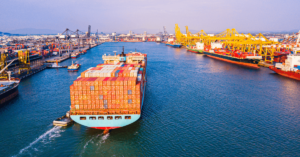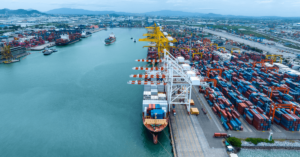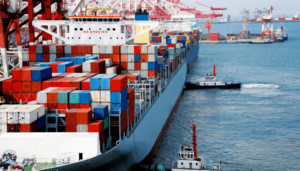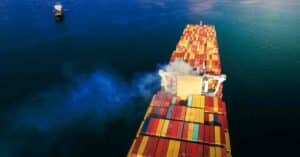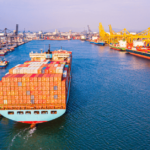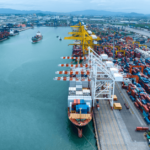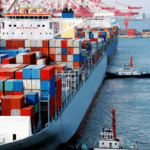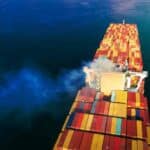What is Blank Sailing?
Ocean cargo vessels usually have a fixed route and ports of call that are known as Schedules.
The schedule includes the vessel’s ETA (Expected Time of Arrival at the port) and ETD (Expected Time of Departure from the port).
An ocean vessel has a fixed number of days to complete the schedule and get back to its base. The ship takes cargo from these ports and discharges them as per their bookings at the respective ports of discharge.
The ship’s voyage might also include stops for routine bunkering and other maintenance of the vessel.
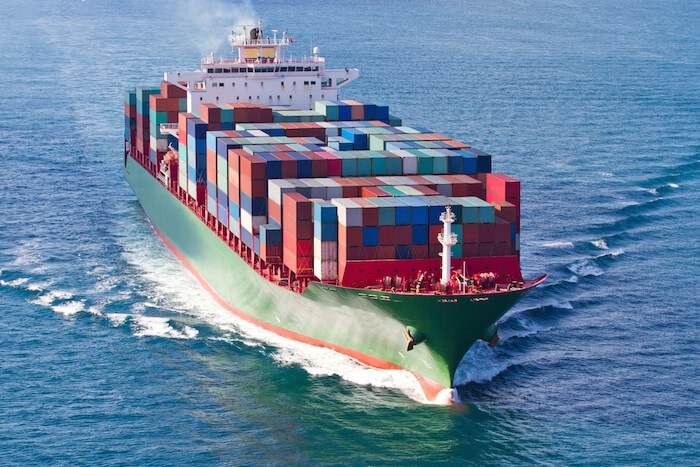
When an ocean vessel does not call at one or more of its scheduled intermediate stops, it is called a blank sailing or void sailing from these ports.
It could be from one or two specific ports or the entire voyage could be cancelled.
When the entire voyage is cancelled it is called ‘blanking the string’. Customers who have been waiting to load or offload cargo will find that they have to wait for the next sailing to pick up or drop-off their cargo.
The list of ports that are served by the carrier is called a ‘string’.
Let us say a carrier sails between port A and port D. In this case, the carrier sets sail from port A, reaches port B, then C, and finally its destination port of D.
At port D it offloads goods as well as takes in goods meant for port A. It then sails for port A.
These ports from A to D is called the string.
As it can be seen here, the vessel completes a circle and reaches back at the port from where it started.
The voyage taken by the vessel is usually in a fixed ‘circle’, in the same direction, with a timetable of fixed arrivals and departures at these ports.
Blank or void sailing may be understood better with the following example.
A vessel has a schedule from the Port of Tangier in Morocco to the Jeddah Port, Saudi Arabia, as follows:
1. Vessel sets sail from Tanger Med terminal on 19 November.
2. Arrives at Algeciras in Spain on 20 November and sails out on 21 November.
3. Arrives at Valencia in Spain on 22 November and leaves on 23 November.
4. Arrives at Fos Sur Mer, France on 23 November and departs on 24 November.
5. Arrives at Port Vado Ligure, Genoa, Italy on 25 November and sails out 26 November.
6. Arrives at Jeddah port, Saudi Arabia on 1 December.
If the above vessel had no cargo to pick up from Fos Sur Mer port and let us say there was a severe labour problem at Vado Ligure port threatening to delay berthing and sailing of vessels, the ship may decide to skip both Fos Sur Mer and Vado Ligure and sail for Jeddah directly from Valencia.
In this case, Fos Sur Mer and Vado Ligure will have blank sailings.
Cargo that was meant for Vado Ligure and Fos Sur Mer will be offloaded at Valencia to catch the next ship to these destinations and cargo meant to be loaded from the Vado Ligure will have to wait for the next ship to pick it up. This might take a week or more depending on the sailing schedule.
As we can see in the above example, two ports in the string had blank sailings – Fos Sur Mer and Vado Ligure. The blank sailings resulted in cargo to these ports being offloaded at Valencia to take the next to ship sailing to these ports.
It also resulted in the cargo from Vado Ligure not being lifted.
Why do Blank Sailings Happen?
The total number of days in a vessel’s schedule would include its sailing days, days taken for loading and unloading, and any other known factors.
When the ship is unable to meet any of these deadlines, it is sometimes forced to skip certain ports of call.
Generally, blank sailings are planned at short notice by shipping lines to meet certain uncertainties. It might be the only way to counter internal or external issues.
An internal uncertainty is when there is a low demand for container space onboard a certain vessel, covering a specific string. In such an event, the shipping line might cancel calling at one, two, or more ports from where there is no booking of cargo at all or when bookings are marginal.
It is common to have blank sailings following major holidays as cargo bookings will be low immediately after such holidays.
Carriers might also decide to change the complete string. This usually happens when shipping lines merge or when carriers enter into agreements and form alliances.
A new alliance or agreement might decide to change a string to optimize cargo capacity and bring down costs.
During the second and third quarters of the year 2020, several trans-pacific and Asian lines had cancelled strings and blank sailings due to the very low demand for cargo space as a result of the coronavirus pandemic.
The container market is currently picking up, but at a very slow pace. Shipping alliances have so far cancelled hundreds of services on account of low cargo volumes.
The services between Asia and North America are the worst hit. This is an unexpected situation as everyone had expected the pandemic to be brought under control within a short time.
Carriers also resort to blank sailings so that the few services that sail will go with full cargo loads. Besides helping them optimize their services they also use this as a factor to push up their rates. However, such rearrangements require careful logistics and planning.
Blanking sailings can happen in the event of a vessel running into mechanical problems that call for repairs that can only be done from certain ports.
Recently, the International Maritime Organization (IMO) implemented a regulation that capped the sulfur content in marine fuels to 0.5%. Before this, it was capped at 3.5%. This new regulation came into effect on 1 January 2020 to control marine pollution and in line with other global pollution control initiatives.
As soon as the announcement was made by the IMO sometime in early 2019, vessel operators went into overdrive getting their large container vessels retrofitted with the Exhaust Gas Cleaning System (EGCS), commonly known as Scrubbers, that would help these vessels meet the IMO’s requirement.
Due to the large demand for having these scrubbers fitted to vessels and a lack of trained staff to carry out this work, there was soon a backlog of vessels lined up at shipyards that were equipped to carry out this work. This in turn led to blank sailings on a global scale around this period, leading to space constraints on several sectors.
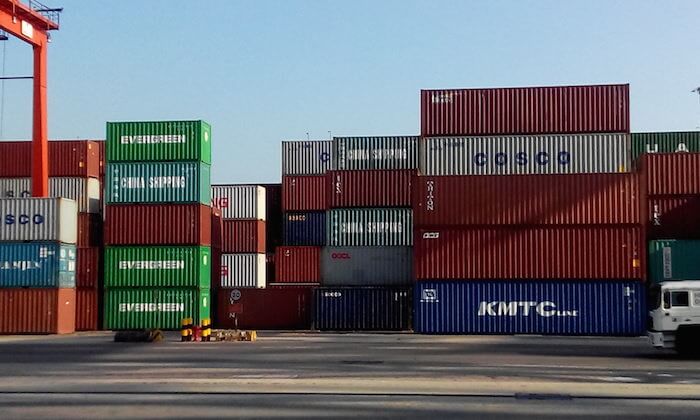
What are the external uncertainties? These could be port strikes, labour unrest, weather warnings, etc. that could affect the vessel’s timely berthing and resailing from a port.
Port strikes and labour unrests usually drag on for a long time. Berthing of vessels and ship husbandry services can be severely affected during such periods of unrest at ports. Weighing in all other factors, a vessel may decide to skip such a port and continue with its voyage.
Weather forecasts and warnings are usually provided by the meteorological department of a country. Violent tropical storm warnings at certain locations may require that vessels passing through ports in such areas cancel their trip.
In other instances, though rare, ships may decide to ‘wait-out’ on such natural phenomena at a safe distance as prescribed in the safety manual of their company, until berthing or sailing is once again considered safe.
The movement of vessels in and out of a port is planned and monitored by the port authorities. Such movements will have to be coordinated with the Harbour Master or relevant port authorities whose responsibility is usually, to ensure the smooth movement of vessels in and out of their respective ports, the pilotage of such vessels, and their berthing.
Blank sailings are usually informed to customers by the carrier or the carrier agent through its sailing schedules. Major vessel operators such as Maersk, MSC, COSCO, CMA-CGM, etc. have monthly advisories that inform customers regarding blank sailings.
Cargo that is booked on a blank sailing has to be re-booked on the next available vessel. This can be a tricky situation as there might now be a build-up of cargo due to the absence of service.
Stevedoring functions at such ports could also be impacted as they have to deal with this unexpected volume of cargo. The frequency of service from the blanked port is another factor to consider.
The gap between services could compound the problem further; it could be weekly, fortnightly, or monthly. If not planned meticulously and executed correctly, blank sailings can affect cargo movement adversely.
Impact of Blank Sailing on Customers
Blank sailing affects customers whether big or small, who have booked cargo to the blanked port or are expecting cargo to come in from such a port. Consider lean supply chains that utilize Just-In-Time (JIT) concepts and are designed to receive just the optimum quantities of raw materials at their production sites.
Blank sailings will throw such supply chains into disarray. It can result in future overstocks for the customer when a pre-booked consignment comes in along with the stocks that were held up on account of a blank sailing.
This affects storage space available with the customer and it might even lead to a situation where the customer may be required to resort to leasing space from a third-party service provider.
For industries, when raw materials are not received as expected, on time, they are forced to use up their buffer or safety stocks. When such stocks are depleted, it affects production.
Customers of finished goods who wish to get the products shipped to their customers on time will also be affected by shipment delays.
Blank sailings will delay dispatch of stocks to customers as promised unless an alternative mode of transport is quickly arranged.
Whenever there is a delay in moving goods between their supply and demand points, there is bound to be confusion.
Alternative methods of transporting goods may not be readily available and even if they are, it would naturally be more expensive. The more the gap between sailings, the more will be the negative impact on customers.
Perishable goods such as food items, flowers, poultry, etc. that have been caught up in blank sailing will have to be diverted or written off.
Cargo meant for specific events such as specialized shows, sports events, etc. will be of no use if delivery is after the date of the show or event.
It is not just the customers who are affected by blank sailings. Auxiliary functions at a port that has been skipped by a vessel lose their business as well. These could include overland transport companies, stevedoring services, etc.
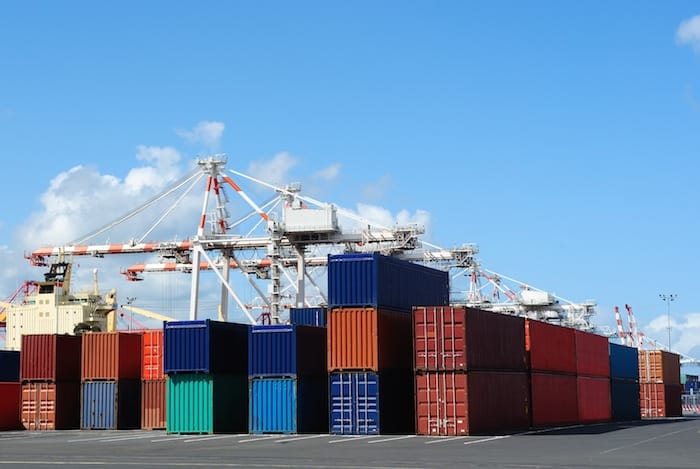
What Can the Customer Do to Negate the Effects of Blank Sailing?
Though shipping companies inform their customers in advance regarding blank sailings, it may be too late for them to take any useful steps to counter the effect of such a blank sailing.
Out-of-stock situations leading to production delays and delayed deliveries may be the result. This is where an effective forecasting system comes in handy.
Optimum safety stocks that take into consideration such stock-outs can, to a certain extent, overcome such situations.
An effective communication system with the carrier or carrier agent can also help the customer get a heads-up on any possible blank sailings or other delays.
Having a back-up transport arrangement to transport goods under such situations, even though it might be more expensive than sea freight, can help businesses from situations of stock-out, etc.
But whether to go in for an alternative transport arrangement will depend on the urgency for the goods and commitments made to the market.
As mentioned above, specialized shows and sporting event organizers could benefit from this kind of arrangement.
Just as they affect customers, blank sailings affect the ocean carriers too.
Most importantly, frequent blank sailings will affect their goodwill and market standing, especially, when the reason for blank sailings is to increase demand for cargo space or to push up the rates.
Over to you..
Do you have any inputs or questions on blank sailing?
Let’s know in the comments below.
You might also like to read:
- Ship Arrest Under Maritime Law: Reasons, Procedure, and Precautions
- Laws Of Salvage; 10 Things You Must Know
- Watch: How Container Shipping Works; The Process Of Transporting Cargo In Containers
- How To Prepare A Container Ship For Loading Cargo?
- A Guide To HAZMAT Cargo Loading On Ships
- 12 Sailing Books For Beginners
Disclaimer: The authors’ views expressed in this article do not necessarily reflect the views of Marine Insight. Data and charts, if used, in the article have been sourced from available information and have not been authenticated by any statutory authority. The author and Marine Insight do not claim it to be accurate nor accept any responsibility for the same. The views constitute only the opinions and do not constitute any guidelines or recommendation on any course of action to be followed by the reader.
The article or images cannot be reproduced, copied, shared or used in any form without the permission of the author and Marine Insight.
Do you have info to share with us ? Suggest a correction

About Author
Hari Menon is a Freelance writer with close to 20 years of professional experience in Logistics, Warehousing, Supply chain, and Contracts administration. An avid fitness freak, and bibliophile, he loves travelling too.
Latest Maritime law Articles You Would Like:
Latest News
- What is the Purpose of DG Shipping?
- What are Logistics Risks?
- How Port and Terminal Operators Can Control Emissions?
- Minimum Quantity Commitment (MQC) and Liquidated Damages in Container Shipping: Concept and Relevance
- MARPOL (The International Convention for Prevention of Marine Pollution For Ships): The Ultimate Guide
- The Ultimate Shipping Container Dimensions Guide
Subscribe To Our Newsletters
By subscribing, you agree to our Privacy Policy and may receive occasional deal communications; you can unsubscribe anytime.




